Alex Waisimon Dedicates Himself to Papua’s Forests and Wildlife
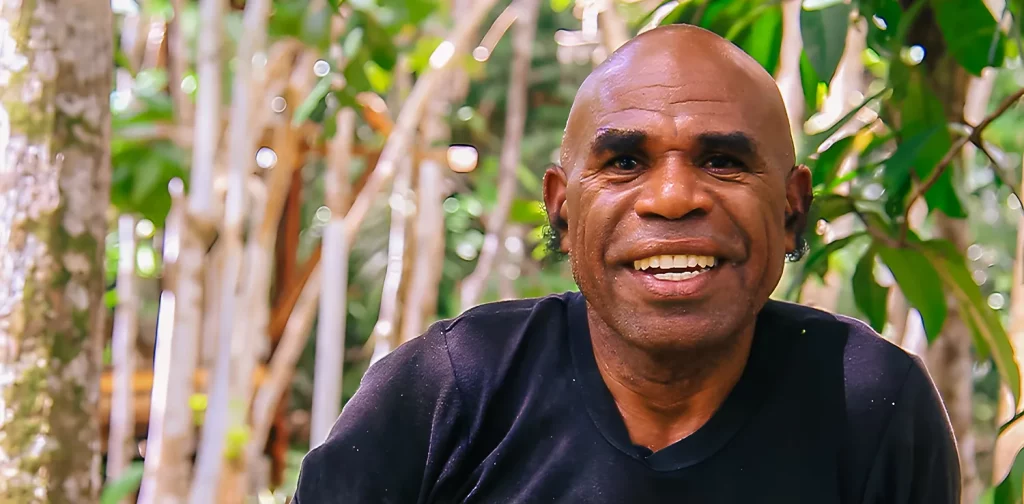
Alex Waisimon| Photo: Forest Watch Indonesia
Papua has the largest forest cover in Indonesia. Spanning 34 million hectares, Papua’s forests are home to thousands of animal and plant species vital to the ecosystems. Unfortunately, just like other forests across the globe, Papua’s forests are not safe from greedy hands. Since a few decades ago, they’ve been under the persistent threats of massive logging and wildlife hunting. These are among the problems Alex Waisimon wants to tackle.
In Nimbokrang District, Jayapura Regency, Papua, Alex Waisimon strives to take care of Indigenous forests and the endemic wildlife that live in them. Even though he can only cover a small part of Papua’s forests, Alex’s dedication matters to the land’s biodiversity and forest ecosystems.
After a long and busy week in the forests, Alex shared his story and experience protecting the Indigenous forests and their biodiversity in Rhepang Muai Village, a part of Grime Nawa Valley. That night, cicadas accompanied his “Good evening” greeting over the phone.
“I live by the forest. So, we can hear the cicadas at night. You can still hear me, right?” he asked.
How Alex Waisimon Began
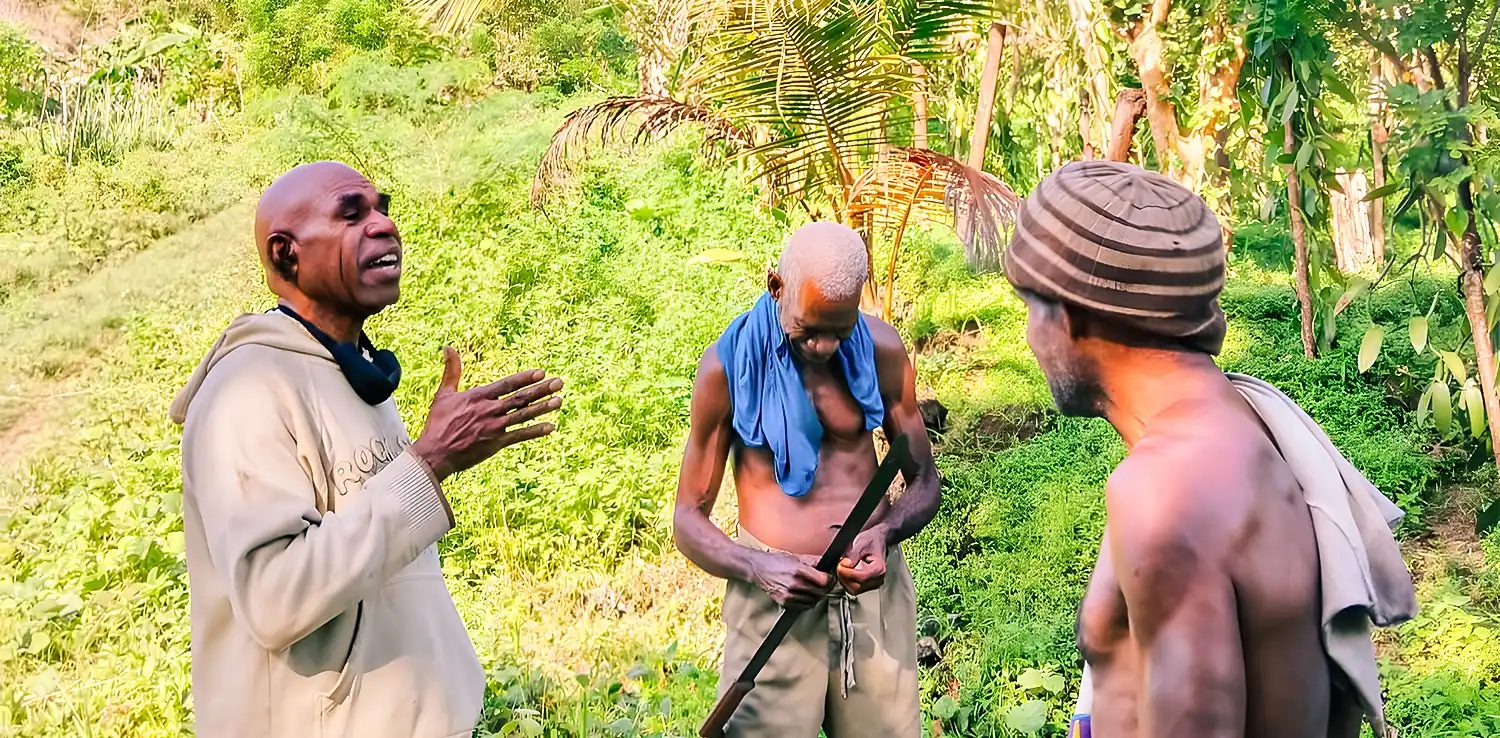
Alex Waisimon was born on September 19, 1961, in the Ombrop Village, Nimboran District, north of Nimbokrang District, where he lives now. After high school graduation, Alex moved out to cities on Java Island until he settled in Denpasar, Bali, with his wife and four children.
Decades of living away from his homeland didn’t dull Alex’s homesickness, especially when he remembered witnessing the destruction of the Indigenous forest in his village by irresponsible parties since he was a child. Finally, in 2014, he moved back to his hometown at 54 to live with his family in Yenggu Village, Nimboran District.
Soon after arriving at Yenggu, Alex saw just how rampant illegal logging and wildlife hunting were. Endemic birds such as cendrawasih (bird-of-paradise), mambruk (crowned-pigeon), and kasuari (cassowary) were hunted a lot. Ironically, his own tribe fellows were among the perpetrators. Along the Jayapura-Sarmi road, the sight of endemic bird sales was commonplace.
“Logging has been happening for 40 or 50 years here, and of course, the hunting. Where there’s illegal logging, there’s wildlife hunting. Some of them are sold outside of Papua. The ones who do this are irresponsible people. I’ve counted 30 big trucks with logs going back and forth each day,” Alex said.
What was even sadder was how wildlife hunting became more prevalent because tourists wanted to keep those exotic animals as pets. He shared, “Many people who came went home bringing animals as souvenirs. Mammals are also hunted, like the tree-kangaroos. Some of them used lasers for hunting. They’re high-tech.”
Alex then tried to make the locals wake up and stop those practices. However, he failed, and the locals got angry at him for disrupting their livelihoods. “I was facing my family and friends from my own tribe. It was tough. Four months in, we couldn’t stand it and went back to Denpasar,” said Alex.
However, the call to come home to Papua was strong. After four months in Denpasar, Alex returned to Jayapura with a stronger resolve and a more thorough preparation. He didn’t come home to Yenggu but to the Rhepang Muaif Village in the Nimbokrang District. There, his efforts to protect the forests and endemic wildlife went a little smoother.
“But it wasn’t as easy as ABC. For the first year and a half, the locals saw me as a crazy person who just got back home. They thought I was stressed in the city because they saw me enter the forest in the morning and come out at night. But I just accepted [their judgment] because I had to stand with my dream to protect Papua’s forests,” said Alex.
Birdwatching Ecotourism
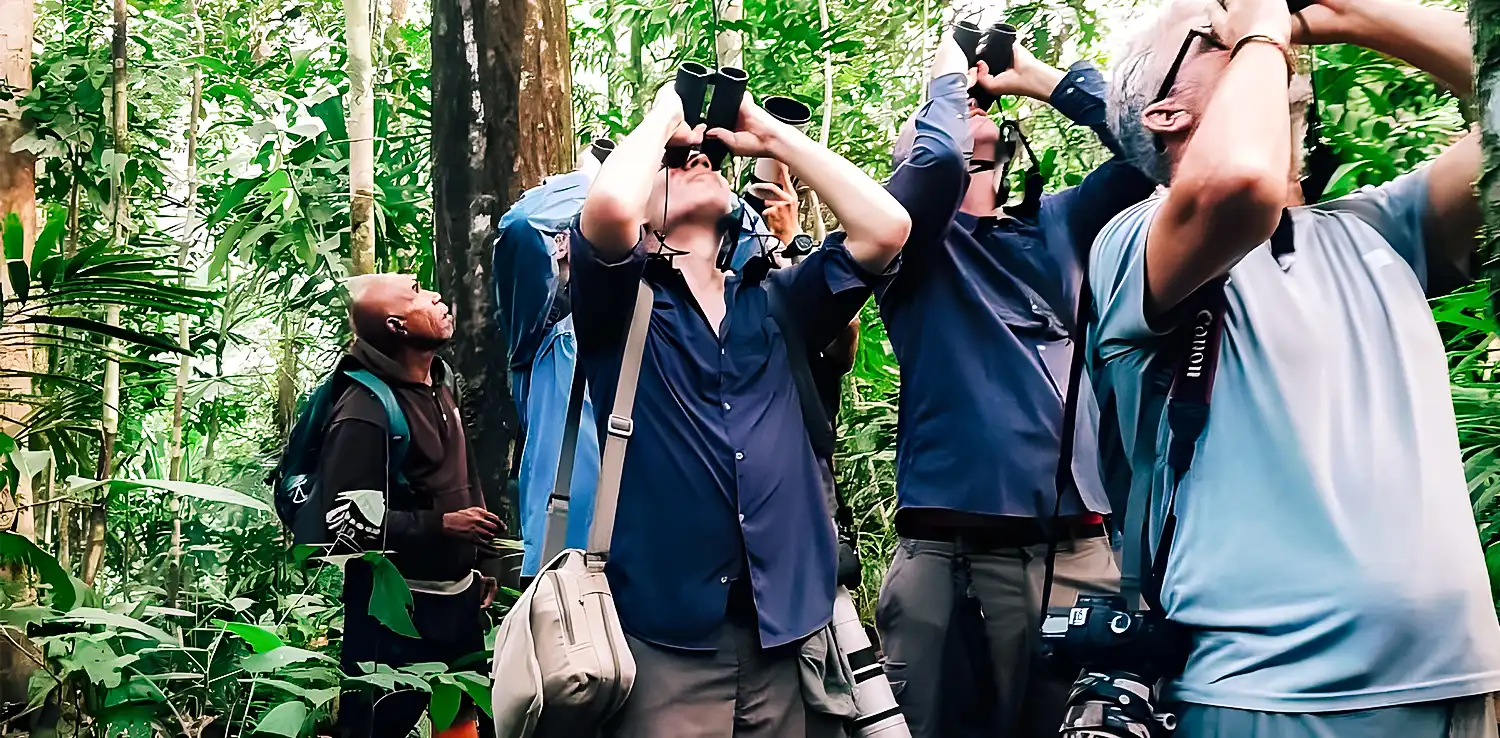
After a successful attempt at convincing the community group who had the customary rights in the Nimbokrang District of the importance of forest conservation, Alex established a birdwatching ecotourism program in May 2015. It’s called Isyo Hill’s Bird Watching, involving 15 people in the group.
The purpose is, of course, to stop illegal logging and wildlife hunting by providing an alternative livelihood for local communities. For Alex, community-based sustainable ecotourism is the most viable way to achieve that in his village.
Every day, Alex and his colleagues strive to protect Papua’s forests while birdwatching, looking for the perfect spots and marking them to share with the tourists. From the monitoring posts, they also patrol the woods every day to ensure no illegal logging activities.
They also ban people from dumping waste and toxins into the river. Within months of its establishment, Isyo Hill successfully prevented dozens of illegal logging attempts at the Rhepang Muaif Forest.
“Through ecotourism, the forest can be saved. If we didn’t turn it into an ecotourism spot, the trees would keep getting cut down. This is somewhat of a ‘middle road’ between protecting the forest and supporting the local economy,” said Alex.
Isyo Hill’s Bird Watching encompasses a 19-hectare land of Indigenous forests. What began in Rhepang Muaif slowly grew. Yenggu Baru and Yenggu Lama Villages in the Nimboran District and Sawesuma Village in the Unurum Guay Village started replicating and adapting the ecotourism concept. According to Alex, dozens of locals from 16 tribes are now involved in the ecotourism program development.
Besides birdwatching, those villages also offered other services such as camping, forest exploration, hill hiking, and lake exploration. These areas see 300 to 400 visitors yearly, most of whom are nature lovers.
Alex said, “The point is that we’ve returned to the nature services that our ancestors used to do. We still have many more to develop. The people of Papua are close to the forests, lakes, rivers, and seas. Now we’re developing the concept so other people can come and enjoy them without destroying them.”
Slowly, the locals, who used to cut down trees and hunt wildlife for additional income, begin to realize the negative impacts of those practices. They are now a part of the conservation efforts.
“We’re starting to see some behavioral changes, especially in the tribes where Isyo Hill operates. Forests started being protected. Wildlife hunting also started to lessen. I told them, ‘You catch one cendrawasih, and you might get one million (rupiah). You’re being ripped off. Your kids and grandkids will never see them again.’ After a while, they realized [it was true]. I invited them to be tour guides so they could make an income from that,” said Alex.
School of Nature
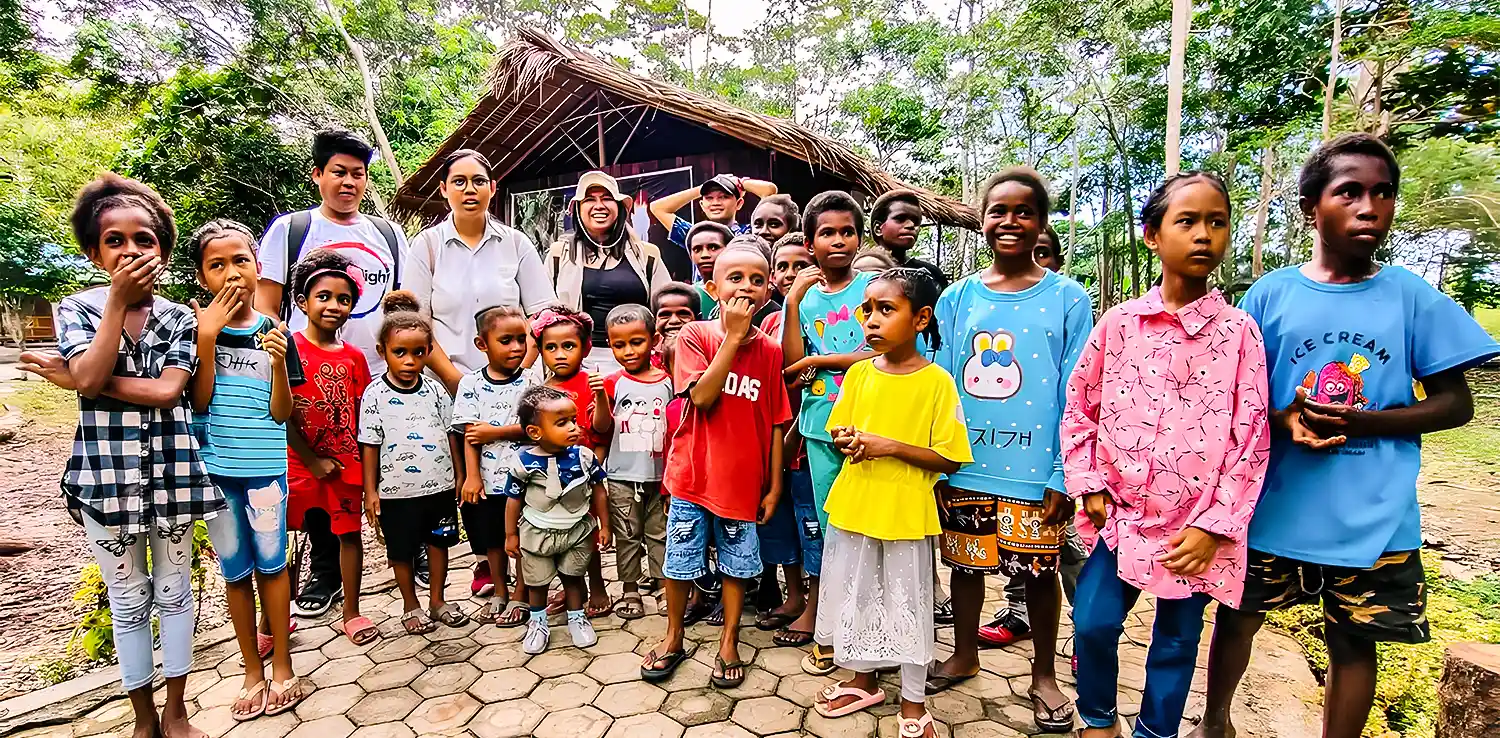
To support his missions, Alex established Yombe Yawa Datum Cooperative in 2017. Yombe Yawa Datum comes from the Genyem language, meaning ‘grow for us all’. Through this cooperative, Alex brought the idea of a school of nature to teach local kids and youth about nature, the wild animal and plant species in the forests, and how to protect them.
Despite its shaky start, Sekolah Alam Yombe Yawa Datum (Yombe Yawa Datum School of Nature) now has a library and three classes: Noken (traditional woven bags), Papuan Indigenous Language, and English. Students from the University of Cendrawasih and Earth Hour Papua Community often volunteer for this school.
“The students are kids around Isyo Hill’s. There is no age restriction. Some are very young; some are teenagers and youths. These are children from 16 tribes. I’m aiming for more students, so this conservation knowledge will be widely known to save Papua’s forests,” said Alex.
Besides the Sekolah Alam, the cooperative also funds the birdwatching ecotourism program’s side businesses like lodges, tour guides, a restaurant featuring traditional Papuan cuisines such as papeda and ikan kuah kuning (fish in yellow soup), and handmade souvenir shops with noken and wooden bracelets.
“We’re trying to improve and develop this traditional craft business so it can replace wild animals as Papua’s unique oleh-oleh (souvenirs),” he said.
Protecting Papua’s Forests
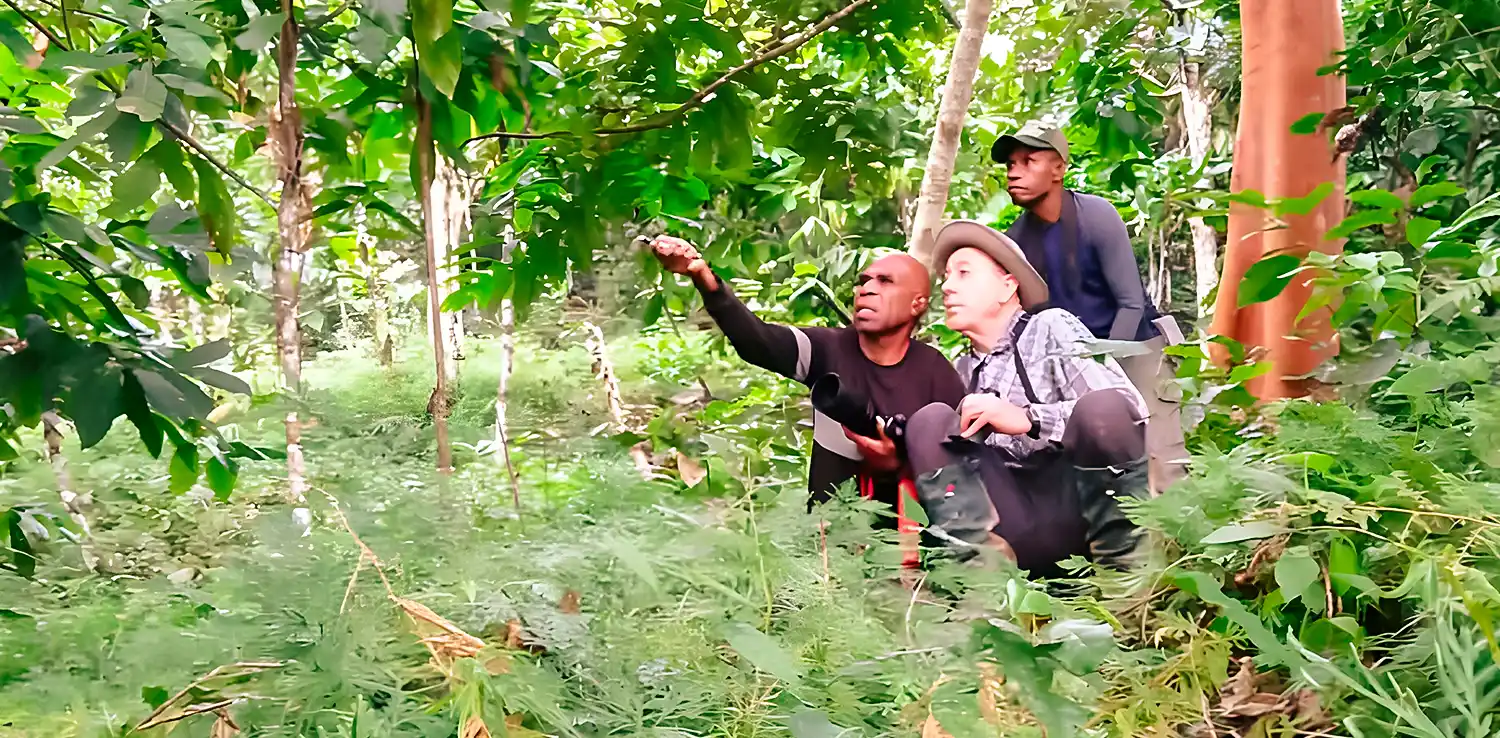
Protecting Papua’s forests isn’t easy. The forest areas Alex has tried to preserve through his ecotourism program are only a tiny part of the province’s expansive forests.
“All of this is not easy. Especially for a small individual like me, it’s impossible to fully prevent illegal logging when faced with irresponsible parties backed by the institution,” said the man who received the Kalpataru Award and was named the ASEAN Biodiversity Hero 2017.
Therefore, Alex invites all stakeholders to protect Papua’s forests together by fulfilling their roles. Alex believes that protecting and recognizing Indigenous Peoples and Local Communities’s rights is one of the keys to achieving this mission.
“Indigenous peoples have been protecting the forests since ancient times. And what did they get? Their forests kept getting destroyed. This country must understand well that the demands of Indigenous peoples, such as rights over Indigenous forests, villages, and others, must be met. No more corporate expansions of oil palm plantations or mining in Papua. Indigenous peoples now want to live with nature because it’s their riches and resource,” Alex said, finishing off.
Translator & Editor: Nazalea Kusuma
The original version of this article is published in Indonesian at Green Network Asia – Indonesia.

Co-create positive impact for people and the planet.
Amidst today’s increasingly complex global challenges, equipping yourself, team, and communities with interdisciplinary and cross-sectoral insights on sustainability-related issues and sustainable development is no longer optional — it is a strategic necessity to stay ahead and stay relevant.
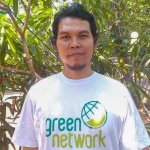
Abul Muamar
Amar is the Manager of Indonesian Digital Publications at Green Network Asia. He holds a Master’s degree in Philosophy from Universitas Gadjah Mada and a Bachelor’s degree in Communication Studies from Universitas Sumatera Utara. He has over ten years of professional experience in journalism as a reporter and editor for several national-level media companies in Indonesia. He is also a writer, editor, and translator with a particular interest in socio-economic and environmental issues.


 Embracing the Business Value of Sustainability
Embracing the Business Value of Sustainability  American Farmers Call for Government Support Amidst PFAS Contamination
American Farmers Call for Government Support Amidst PFAS Contamination  Asia Pacific’s SDG Progress Faces Major Setbacks
Asia Pacific’s SDG Progress Faces Major Setbacks  Exploring the Bidirectional Relationship Between Olympic Games and the Environment
Exploring the Bidirectional Relationship Between Olympic Games and the Environment  The Hidden Threat of Tire Pollution to Salmon Populations
The Hidden Threat of Tire Pollution to Salmon Populations 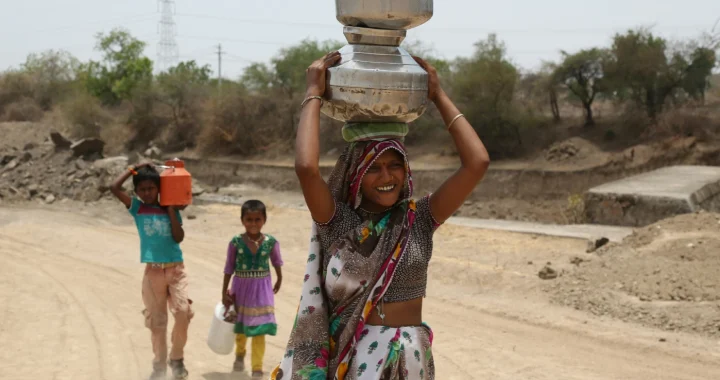 Understanding the Climate-Care Nexus
Understanding the Climate-Care Nexus